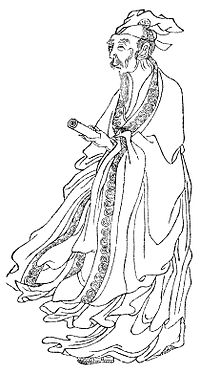| Last Name: | 白 | ||||||
| First Name: | 居易 | ||||||
| Name and Alias: | 乐天 | ||||||
| Web/Pen/Nick Name: | 香山居士 | ||||||
| Township: | 山西太原 | ||||||
| Birth Place: | 河南新郑 | ||||||
| Death Place: | 东都洛阳 | ||||||
Read works of Bai Juyi at 散文天地 Read works of Bai Juyi at 诗海 | |||||||

Bai Juyi or Po Chü-i (白居易) (772 - 846) was a Chinese poet of the Tang dynasty. His poems are not cheerful, and were themed around his responsibilities as a governor of several small provinces to sympathise with his people. He is renowned in Japan as well, where he is called Haku Rakuten.
Life
Bai Juyi was born in Xinzheng to a poor but scholarly family. At the age of ten he was sent away from his family to be educated near Chang'an. He passed the jinshi degree in 800. His official career was initially successful: he was a Member of the Hanlin Academy and Reminder of the Left from 807 until 815, when he was exiled for remonstrating too forcefully. His career resumed when he was made Prefect of Hangzhou (822-824) and then Suzhou (825-827).
Work
He wrote over 2,800 poems, which he had copied and distributed to ensure their survival.
He is most notable for the accessibility of his work. It is said that he rewrote any part of a poem which one of his servants was unable to understand. He tried to use simple language and direct themes. Two of his most famous works are the long narrative poems Song of Eternal Sorrow, which tells the story of Yang Guifei, and Song of the Pipa Player. Like Du Fu, he also had a strong sense of social responsibility, and he is also well-known for his satirical poems, such as The Elderly Charcoal Seller. Bai Juyi's accessibility made him extremely popular in his lifetime in both China and Japan, and he continues to be so today.





